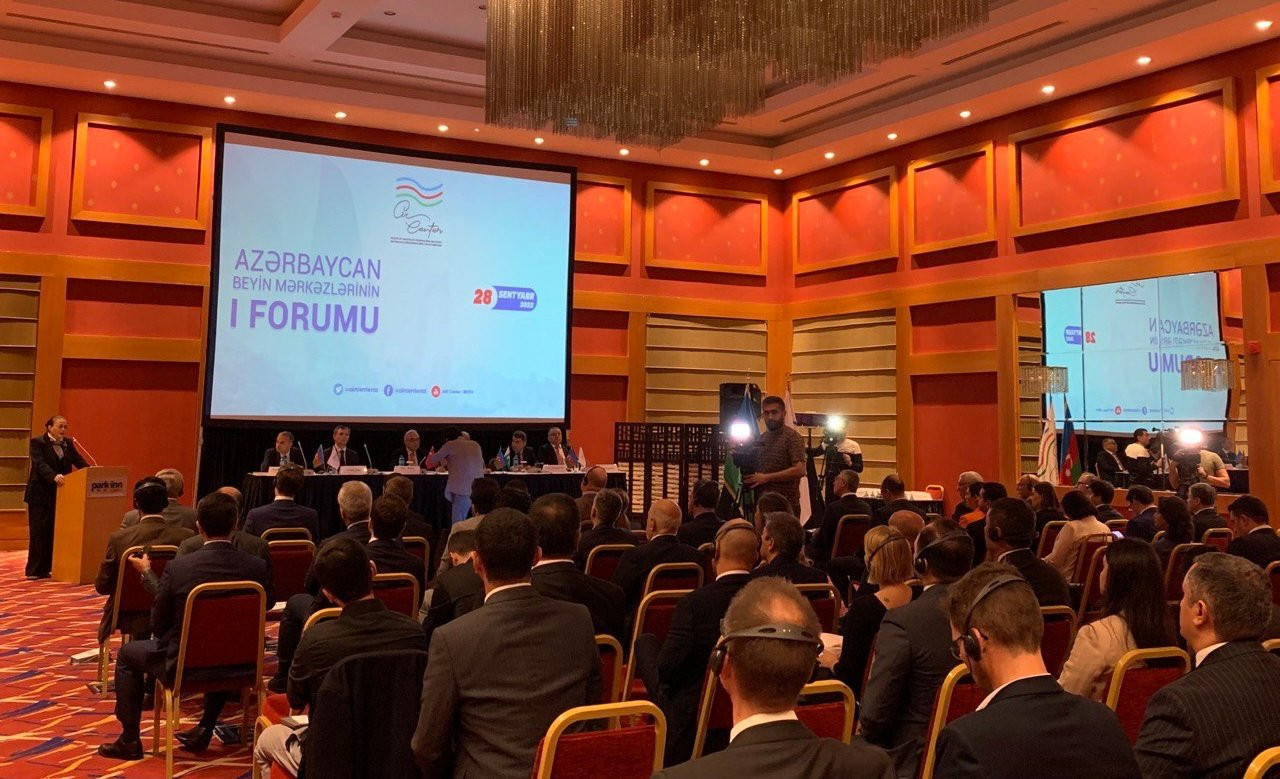The Forum aimed to stimulate the activities of the think tanks, organize their activities in line with modern requirements, as well as to ensure the establishment of regular communication and cooperation between think tanks and public institutions. The Forum brought together the representatives of local and foreign think tanks, as well as various government agencies.
In the beginning of the Forum, martyrs were commemorated with a minute of silence.
In the first panel of the Forum, AIR Center Chairman, Farid Shafiyev, made an introductory speech, pointing out agenda’s important targets on how to organize the activities of think tanks in Azerbaijan. Representatives of foreign think tanks were also invited to the forum to share their thoughts on that matter. “What are the new technologies, new trends in this field? One of the main tasks of think tanks is related to forecasting. There are some problems in this direction. Networking with government agencies is also very important. Forecasting is extremely important in analyzing future threats. We observe a very complex geopolitical situation around Azerbaijan. Clearly, the topic of making appropriate predictions and conducting research on these issues should be included on think tanks’ agenda.
Saadat Yusifova, Deputy Head of the Non-Governmental Organizations and Communications Department of the Administration of the President of the Republic of Azerbaijan, noted that nowadays international relations continue to become more complex and unpredictable. The need to respond to global challenges such as the COVID-19 pandemic, the war in Ukraine, the rekindling of regional conflicts, the wave of social discontent caused by the global political-economic crisis, climate change, natural cataclysms require the joint efforts of states, international organizations, international community and think tanks as well. Think tanks act as mediators between academic communities and authorities, government and civil society.
She also emphasized on the development of information technologies and social media that has accelerated the process of information exchange thus forming new actors in this field (bloggers, influencers, etc.). The development of information technology has made the information accumulation simpler while dramatically increasing the spread of disinformation and fake news.
It was also pointed out that the number of non-governmental organizations that want to perform as think tanks in Azerbaijan increased in recent years. Currently, the number of think tanks operating as NGOs is about 30. About 20 of them are closely collaborating with the state, and another 10 are completely independent or connected to various political forces.
Later on, Zahid Oruj, the Member of the Parliament and the Chairman of the Center for Social Researches mentioned that the First Azerbaijan Think Tank Forum coincided with the second anniversary of the Patriotic War, making it as an important event against the backdrop of current regional and international challenges. He said that at a time when humanity is facing a new world order, our state has never been as strong as it is now in the geography where it is located in the last three decades.
Retired Turkish diplomat Alev Kılıç and the director of the Eurasian Research Center (AVIM), stressed out that he is very happy with the changes he observed in Baku, and expressed his confidence that today's discussions will be useful. The diplomat said that the peace agreement between Azerbaijan and Armenia has not been signed yet. Of course, the culprit of this is Armenia, which is highly influenced by the outside manipulations. . We believe that Armenia will finally be able to make a sound decision and come to peace.
ADA University’s vice-rector Fariz Ismayilzade noted in his speech that our world is changing rapidly, emphasizing that social research centers have a great responsibility against the background of global problems. The vice-rector also pointed out that currently the main difficulty is related to availability of information access which should be facilitated. The second challenge he pointed out to be financial, as quality and quantity are related to each other. Speaking about social media, Fariz Ismayilzadeh said that trainings should be carried out with young analysts paying attention to overlooked fields.
Vusal Gasimli, executive director of the Center for Analysis of Economic Reforms and Communication highlighted the role of the information and technology revolution in stimulating the activity of think tanks.
The Forum went on with discussions on such topics as “The role of Think Tanks in Peacebuilding Efforts in the South Caucasus after the Second Karabakh War”, “The role and initiatives of think tanks in the reconstruction, economic development, and the large-scale resettlement of citizens in the liberated territories” and “The problem of preserving national identity in a globalized world”.
Further panel speeches on above-mentioned topics were made by the Chairman of the Islamabad Institute of Strategic Studies, Khalid Mahmud; the executive director of "New Direction" think tank of the Kingdom of Belgium, Witold de Chevilly; the representative of the Royal Egmont Institute for International Relations, Bernard Siman; the director of the Center for Strategic and International Studies, Eldar Namazov; Araz Aslanli, Chairman of Caucasian Center for International Relations and Strategic Studies, Rusif Huseynov, co-founder and director of the Topchubashov Center; Parvin Mammadova, head of the Fundraising and Communication Department of the Karabakh Revival Fund, Araz Imanov, Senior Advisor of the Special Representation of the President of the Republic of Azerbaijan in the liberated part of the Karabakh Economic Region; Director and Co-founder of STEM Center, Orkhan Yolchuyev; the Executive Director of Baku International Multiculturalism Center, Ravan Hasanov; the Executive Director of Science Development Foundation under the President of the Republic of Azerbaijan, Mehriban Imanova; Aygun Aliyeva, the Executive Director to the State Support Agency for NGOs; Fargan Novruzov, Member of the Board of Experts, Media Analysis Center; Zaur Mammadov, Head of the Baku Club of Political Scientists.




